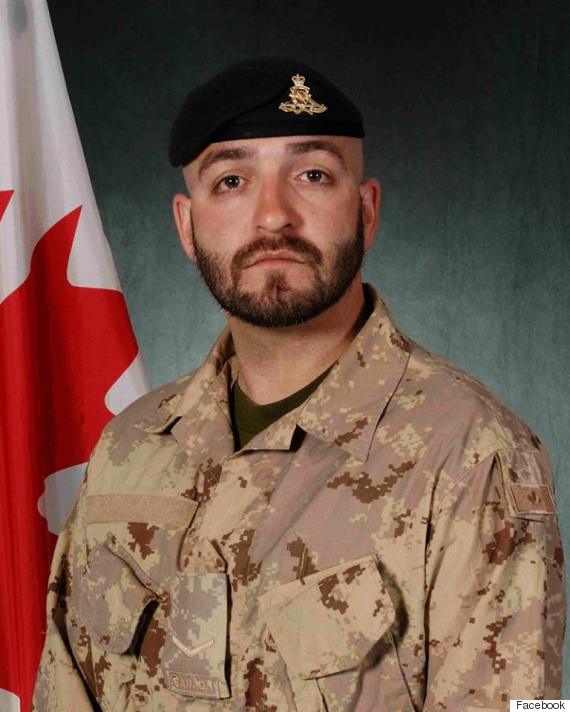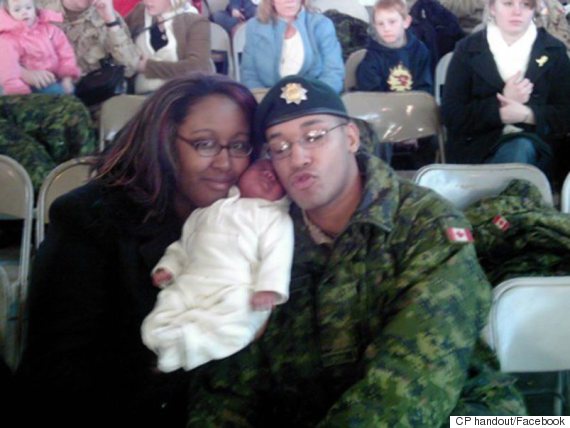Military veteran’s suicide preceded by calls for help
 This Canadian Veteran's Death Is On All Of Us
This Canadian Veteran's Death Is On All Of Us
This Canadian Veteran's Death Is On All Of Us
 Jeff Rose-Martland
Jeff Rose-MartlandPosted: 02/16/2017 11:37 am EST
On Saturday, February 11, a Canadian veteran suicided. Sadly, that story has become routine. This soldier did it in front of police. That, too, is becoming an old story. This veteran was fighting for help from Veterans Affairs. That story is so common that we barely notice anymore; we assume every veteran is fighting with VAC.

Bombardier Carl Jason Dunphy.
The veteran from Edmunston, NB was Bombardier Carl Jason Dunphy, of the 5e Régiment d'artillerie légère du Canada. He served three tours in Afghanistan. He had short-term memory problems from the multiple concussions he received from roadside bombs. He also had PTSD. He may even have had other injuries which haven't been reported. He'd been appealing -- begging -- Veterans Affairs for help for his problems. On the morning of his death, Carl posted on Facebook:
"It's eating away at my resources and my strength. It's not up to friends and spouses to deal with this because a government organization doesn't act."
Within hours, apprehended by the Sûreté du Québec in St-Louis-du-Ha!-Ha!, Carl got back in his car and shot himself.That's how Canada handles these sort of things.
Carl is yet another delayed casualty of the war in Afghanistan. Canada lost 158 troops over there. By 2014, we had lost 160 Afghanistan veterans to suicide back here. The count is much higher now, but we stopped officially keeping track. Frequently, we don't even give their rank, denying the fallen even token respect.
Pay close attention to government -- or any civilian -- discussion of veterans' suicide. You will hear a whole lot of statistics tossed around, especially ones comparing the incidence of mental illness between veterans and the civilian population. You will see comparisons of the suicide rates between those groups. There will be a lot of victim blaming, couched in statements like "we are there for veterans who ask for help." You will witness much hand-wringing by authorities, a lot of talk about how sad this is, and loads of implied shrugs and "What are ya gonna do?" Then, as soon as Carl is buried, or sooner if public attention can be distracted, everyone will go back to whatever they were doing.
That's how Canada handles these sort of things. We have shown it time after time. Even after the horrific murder-suicide of Lionel Desmond last month -- another veteran begging VAC for help -- we went back to ignoring the wounded. At the end of the news cycle, Canada simply doesn't care about these veterans.

Veteran Lionel Desmond and his family. Photo
We do everything in our power to ignore these deaths. We don't want to think about them, because we want the war to be over, because we want the victims to be responsible for their fate, because we refuse to accept our responsibility to those who serve.
It's easy to see that at work: just look at how we compare veterans and civilians. It's like comparing apples and fire trucks -- other than being red, there's no commonality. Veterans and civilians are both people, but that's the end of the similarity. We conveniently forget the rigorous screening of applicants done by the Forces. Applicants are not only selected based on physical fitness; they are also screened for mental health. Before basic training starts, recruits are the healthiest people around. Training weeds out those who cannot achieve even greater fitness; that's the whole point of the rigors of basic. By the time recruits have passed and become full members of the Forces, the graduates are strong and fit in all respects.
How can we possibly compare these elite-screened and trained individuals to the rest of us? On average, Canadians are not particularly fit and healthy. The incidence of mental illness in the general population is largely due to the random factors which drive all disease; we haven't been screened. One doesn't compare the rate of heart disease among Olympic athletes to the rest of us fast-food eating, coffee swilling, smoking, lazy arses. Why are we comparing the mental health of soldiers and civilians? Because we want to duck our responsibility.
We call it a tragedy, like some Greek or Shakespearean drama, blaming the gods or fate or some vagary.
The truth is this: we take people who are in top condition physically and mentally, and we break them in body and mind. We send them off to do the dangerous and dirty jobs us civilians can't face. We push them out front, to face the horrors and uglies, to put their flesh and minds between us and harm. We use them like tools, working them until they break.
Then we chuck them aside and make them fight us for their benefits, until we break their spirit. We ignore their cries for help, even as we declare help is available. When they suicide, we call it a tragedy, like some Greek or Shakespearean drama, blaming the gods or fate or some vagary. The true fault lies not in the stars, but in ourselves -- our sanctimonious, excuse-making, sniveling, victim-blaming selves. We may call ourselves civilians, and thereby suggest that we are generous and caring and somehow better than these dupes we dispatch to do our dirty work. There's nothing civil or enlightened or even humane in how we treat our veterans.
We cannot continue to hide from the truth. We broke them; we owe them. No amount of re-framing will change that fact. If these veterans made it home from a war, then we should be able to stop them being further casualties. Instead of stalling, delaying, demanding more proof of injury, blaming bureaucracy, and permitting Veterans Affairs and the Forces to point the finger of responsibility at each other, we need to react as quickly as Canadians do in times of crisis. We need to dive in and make things work. We need to grab on to the wounded, saying "It's going to be OK."
And we have to make it OK.
http://www.huffingtonpost.ca/jeff-rosemartland/canada-is-failing-veterans_b_14793648.html
Guest- Guest
 Military veteran’s suicide preceded by calls for help
Military veteran’s suicide preceded by calls for help
Military veteran’s suicide preceded by calls for help
Carl Jason Dunphy, 39, wrote of frustration with Veterans Affairs Canada before ending his life in Feb. 11 confrontation with Quebec police

Carl Dunphy, a 39-year-old military veteran apparently suffering from PTSD and battling with Veterans Affairs Canada killed himself in a confrontation with police in the Quebec town of Saint-Louis-du-Ha! Ha! on Feb. 11, 2017.
By ALLAN WOODS Quebec Bureau
Tues., Feb. 14, 2017
MONTREAL—A Canadian military veteran with post-traumatic stress syndrome killed himself Saturday in a confrontation with police just hours after complaining about the government’s handling of his case.
Carl Jason Dunphy, 39, wrote on his Facebook page Saturday morning that he had been fighting with Veterans Affairs Canada for additional help with operational stress injuries after serving three combat tours in Afghanistan.
“It’s eating away at my resources and my strength. It’s not up to friends and spouses to deal with this because a government organization doesn’t act,” the native of Edmunston, N.B., wrote.
That night, the Sûreté du Québec responded to a tip from the Edmunston police force about a suicidal man headed into their jurisdiction.
After tracking the individual using cellular telephone signals to the Quebec town of St-Louis-du-Ha!-Ha!, about 70 kilometres from Edmunston, officers found a man in his car with another person.
“The police forced them out of the vehicle, but the man quickly jumped back into the car and turned his handgun on himself,” said a statement from Quebec’s Bureau des Enquêtes Indépendantes, which investigates deaths and injuries resulting from police interventions.
No additional details about the other person in the vehicle or the actions that led up to the incident were released.
The death of Dunphy, who served with the 5e Régiment d’artillerie légère du Canada, which is based in Valcartier, Que., has sent shockwaves through the military and veteran’s community.

One of Dunphy’s friends says the Canadian military veteran suffered multiple concussions as a result of roadside-bomb strikes over the course of three deployments in Afghanistan.
Paul Nichols met Dunphy in Edmunston during the tail end of a horseback ride across Canada in 2015 to raise awareness about veterans’ issues.
Nichols said in an interview that Dunphy had suffered multiple concussions as a result of roadside-bomb strikes over the course of three deployments in Afghanistan and was left struggling with short-term memory as a result.
“He was just a huge-hearted man who was really just trying to find his way,” Nichols said from his farm in Quesnel, B.C. “He told me that he was going to ride for the ones that couldn’t.”
Pierre-Luc Jean, a friend, said he was worried about Dunphy after reading the Facebook posting Saturday morning and felt instinctively that it was his friend who was the subject of news reports Sunday referring to an Edmunston man who took his life later that night in a run-in with police.
Dunphy had spoken openly about his experiences during three combat missions in Afghanistan as well as his frustrations getting help from Veterans Affairs Canada.
“I’m not his oldest friend. It’s only two or three years that I’ve known him but it has always been like that,” Jean said in a telephone interview from his home near Quebec City.
“Over the last year he’s been trying to get additional psychological help. He wanted medical help as well as money for his treatments because if he wasn’t able to get help (from Veterans Affairs Canada) he wanted to get it elsewhere.”
A spokesperson for Veterans Affairs Canada said the government could not comment on the particulars of Dunphy’s case both because personal information is protected by the Privacy Act and because the man’s death is under investigation.
“Our thoughts are with the family and friends of the deceased as well as those first responders impacted by this tragedy,” Zoltan Csepregi wrote in a statement.
The statement added: “We are working hard to ensure that each and every time a veteran comes forward with a mental health concern, they receive the support they need.”
But Nichols said Dunphy’s death shows that the government’s support network is still failing those who need help the most.
“Carl was in the system through Veterans Affairs. It’s not like he was living in the bush somewhere on his own and decided to (end his life). He was in the system. He was an active veterans’ voice in his community and I think that we could have done better.”
https://www.thestar.com/news/canada/2017/02/14/military-veterans-suicide-preceded-by-calls-for-help.html
Guest- Guest
 Similar topics
Similar topics» Military watchdog calls for better services after apparent murder-suicide
» Mefloquine / Topics & Posted Articles
» Vet with PTSD from Afgan, kills 3 family members and himself
» Fredericton veteran calls federal cut to medical marijuana coverage 'irresponsible'
» Calls mount for inquiry into Canadian military’s treatment of Afghan detainees
» Mefloquine / Topics & Posted Articles
» Vet with PTSD from Afgan, kills 3 family members and himself
» Fredericton veteran calls federal cut to medical marijuana coverage 'irresponsible'
» Calls mount for inquiry into Canadian military’s treatment of Afghan detainees
Permissions in this forum:
You cannot reply to topics in this forum
 Home
Home Latest images
Latest images